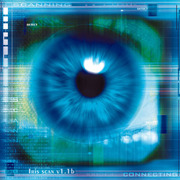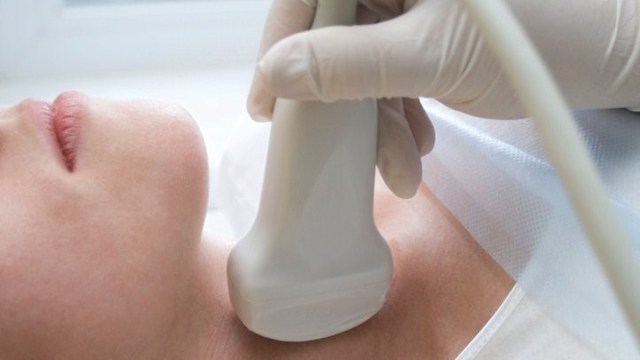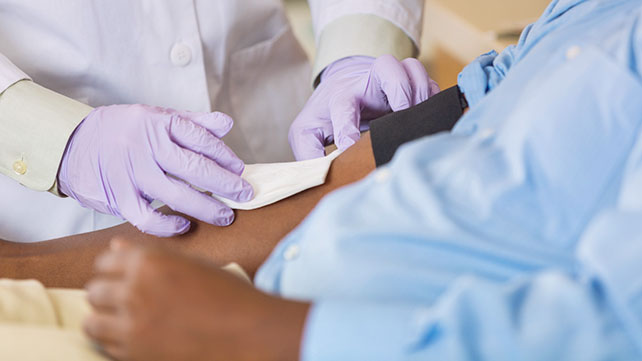 Stockbyte/Thinkstock
Stockbyte/Thinkstock
Graves disease is an autoimmune disease of the thyroid gland. Up to 90 percent of adult patients have some changes in the muscle tissue around the eyes, while 25 to 50 percent have clinical eye symptoms.
Approximately 5 percent are at risk of losing their sight. Graves ophthalmopathy and Graves orbitopathy are terms used in the medical literature for these eye problems.
M. R. Soeters of the University of Amsterdam, the Netherlands, and colleagues provided a review.
The characteristic feature of Graves ophthalmopathy is a wide open eye appearance. Symptoms include light sensitivity, a sandy feeling in the eyes, painful eye movements, and double vision.
Soeters reported there are several ways to rate the severity of eye problems. A useful summary is the “NO SPECS” score:
Class 0: No symptoms or signs
Class 1: Only lid retraction, stare, eyelid droop
Class 2: Soft tissue changes
Class 3: Proptosis (forward displacement of the eyeballs, causing a bug eye appearance)
Class 4: Extraocular muscle involvement, causing eye movement difficulties
Class 5: Corneal involvement, causing impaired vision
Class 6: Sight loss from optic nerve damage
Most patients with Graves eye problems also have symptoms of hyperthyroidism. However, this is not always the case.
Soeters explained that approximately 10 percent of patients with Graves ophthalmopathy have normal thyroid function, or even hypothyroidism at the time they develop eye problems.
Both thyroid tissue and the tissue around the eye contain receptors for thyroid stimulating hormone (TSH).
Thus, autoantibodies that stimulate this receptor can affect both thyroid function and eye health, but these two effects do not always happen at the same time.
Smoking increases the risk of developing Graves ophthalmopathy by a factor of 7 to 8. In addition, smokers develop more severe symptoms with more rapid progression.
Treatment for Graves eye problems depends on the severity. Corticosteroids, other immunosuppressive therapy, radiotherapy, and surgery are options for moderate to severe disease.
Patients who also have hyperthyroid symptoms may benefit from combined thyroid/eye clinics, where they may also receive radioactive iodine or thyroid surgery.
The MedlinePlus web site provides more information on Graves disease. It is most common in adult women, but it can occur at any age, and may affect men as well.
References:
Soeters MR et al, “Optimal management of Graves orbitopathy: a multidisciplinary approach”, Netherlands Journal of Medicine 2011 Jul-Aug; 69(7): 302-8.
http://www.ncbi.nlm.nih.gov/pubmed/21934174
MedlinePlus. Graves Disease. Web. April 13, 2012.
http://www.nlm.nih.gov/medlineplus/ency/article/000358.htm
Reviewed May 2, 2012
by Michele Blacksberg RN
Edited by Jody Smith






Add a Comment3 Comments
No wonder I feel pain and tightness with my left eye. When I look at the left side I feel pain with my left eye. What do you suggest that I do? I do know I have symptoms of hypothyroid and once I get this all treated then I know I wont have such pain with my eye anymore. Thanks so much for such information. My eye doctor didn't even tell me such thing.
Thanks Big TIme,
May 4, 2012 - 8:54pmMelissa
This Comment
I have double vision in my right eye and when I look to the left I have pain and pressure. This started after cataract surgery
August 10, 2018 - 7:56pmThis Comment
Hello.
Have you mentioned this and/or followed up with your eye physician? Most times, there are no complications after cataract surgery. The risk of complications is greater if you have another eye disease or a serious medical condition. Graves would certainly fall into this category.
Occasionally, cataract surgery fails to improve vision because of underlying eye damage from other conditions, such as glaucoma or macular degeneration.
Helena
August 11, 2018 - 5:07amThis Comment